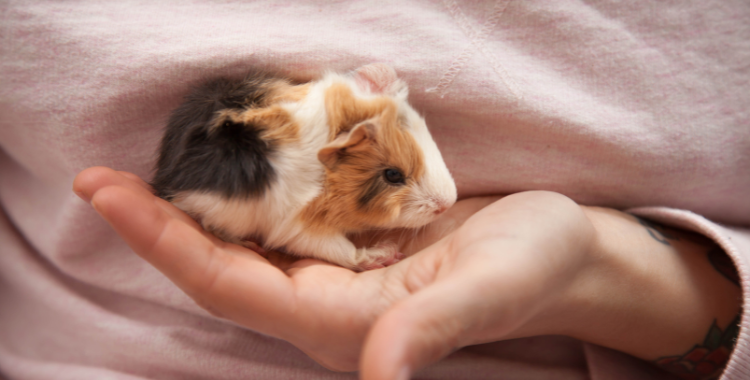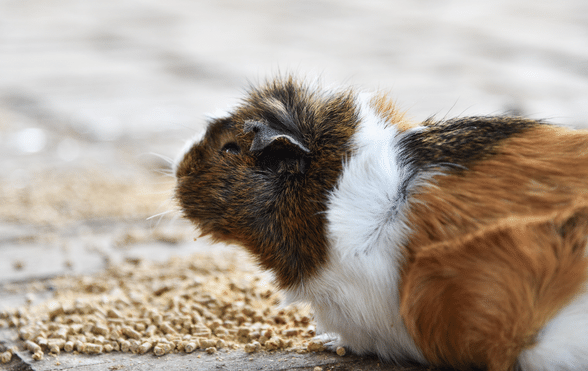With everyone feeling the effects of the cost of living crisis, we wanted to pull together our top tips for saving money for both new and existing guinea pig owners.
Guinea pigs are a popular pet and are often cheaper to care for compared to cats or dogs. That being said, it recommended to house guinea pigs in pairs or small groups meaning guinea pig owners are still faced with a number of costs such as food, bedding, insurance and potentially vet bills.
Our guide covers ways guinea pig owners can save money on a number of areas such as food, bedding, upfront costs and more.
If you’re wanting a more in depth guide on owning guinea pigs, be sure to check out our Ultimate guinea pig guide!
Buy in bulk
If you have sufficient space and a suitable location, you can buy in bulk to save money.
An example of this is hay which forms a large part of your piggie’s diet..
It’s advisable to store hay in a cool and dry location, which is out of sunlight and allows for air to circulate around the room. Ideally you want to keep it off the ground and you need to ensure that the location if free from mice and rats.
Not all hay comes pre-packaged so you may need to follow additional storage guidelines, which you can usually learn more about when buying hay.
It’s also worth noting that hay does still have a shelf-life so be sure you’re buying hay with this in mind.
Wonky fruit and veg
As part of their diet, your piggies should enjoy a variety of vegetables and can also enjoy fruit as an occasional treat.
Many supermarkets offer “wonky” fruit and vegetables. These are often not quite as perfectly coloured or shaped as their non-wonky alternatives. Wonky fruit and vegetables are often cheaper therefore purchasing these over non-wonky fruit and vegetables can be a quick and easy way to save money.
Consider setting up repeat orders
If you’ve not got the storage space to purchase items in bulk, you may wish to set up repeat orders. Many big pet shop chains and online retailers allow you to set up a reoccurring orders which will often save you anywhere from 5-10%.
Within this, retailers offer the flexibility to have your repeat order delivered on a periodical basis to suit your needs and many offer easy cancellation but we advise checking this thoroughly before completing your purchase.
Insurance
Getting guinea pig insurance is a great way to get support and cover any unexpected vets bills.
ExoticDirect offers the option to add additional pets to one policy, which is useful for guinea pig owners as piggies should be kept in pairs or small groups.
You should bear in mind that insurance comes with Terms and Conditions which you should read carefully before taking a policy out.
Click here to learn more about Small Mammal Insurance, including guinea pig insurance.
Switch to reusable bedding
If you’re using single use bedding such as paper-based bedding or wood shavings, you may wish to consider reusable bedding in the form of guinea pig fleece.
Specifically designed for piggies, guinea pig fleece is a reusable bedding option which can simply be washed and reused time after time. It’s sold in a variety of places such as pet shops, online retailers and guinea pig specific retailers.
Different guinea pigs have different preferences, so you may want to be cautious and try them with a small amount of fleece to ensure they like it before comitting to it as their only bedding option.
Regardless of bedding type, you should aim to spot-clean your piggies cage every day and do a deep clean twice a week. For more information about guinea pig bedding and cleaning guidance, view our ultimate guinea pig guide here.
Switch up your piggies layout
Guinea pigs require enrichment and entertainment within their environment. To save this becoming costly, consider switching up their layout every so often rather than purchasing new items for it.
Simply switching the location and angles of items can be a great way to provide them with new ways and places to explore.
Additionally, sturdy cardboard boxes can be a good addition and can create new places for your piggie to explore but keep an eye out for chewing as cardboard can sometimes be a little tempting for your piggie to chew.
If you’re ever in doubt about whether an item is safe for your piggie, hold off on introducing it and seek support from a vet to be safe.
Upcycle
Following on from the previous point, you can easily create fun and enriching environments and toys for your piggie with items you may have otherwise thrown away.
Cardboard tubes and boxes make great toys for piggies as they can easily be stuffed with hay and food to provide an entertaining, foraging opportunity for your piggie.
Other great ideas include making hides for your piggies from plastic storage containers, or taking a wiffle ball and stuffing it with hay or food for your piggie to roll around and play with.
There are endless opportunities for homemade piggy toys but you need to exercise caution. Always keep a close eye on your piggies, especially if they’re avid chewers and never give them anything that’s broken or anything that containers rough or sharp edges. If you’re ever in doubt, consult with a vet for their reccomendations.
Ensure your piggies are accurately sexed
Guinea pigs can be sexed from around 2-3 weeks of age with most pet shops selling them when they’re around 6-8 weeks old.
With this in mind, you should ensure that you get guinea pigs of the same sex to ensure you avoid any unwanted pregnancies. Pet shops should be able to accurately sex guinea pigs but if you’re ever in doubt, it’s worth checking with your vet.
Ensuring you only get same-sex pairs or groups will prevent any unwanted piggie pregnancies therefore saving you money.

Baby guinea pigs are cute, but costly. Ensuring your piggy is accuratley sexed to prevent unwanted pregnancies.
Purchase seasonal fruit and veg
Buying fresh produce when it’s in season and avoiding out-of season vegetables and fruit is a great way to save money.
You should be feeding your piggie a variety of fruit and vegetables as standard but ensuring you stick to what’s in season e.g. tomatoes in summer and carrots in winter can be a great way to ensure you’re not overspending by purchasing vegetables and fruit which is out of season.
Think about your leftovers.
Guinea pigs require a portion of vegetables every day and fruit should be fed as a treat several times a week.
In addition to this, certain vegetables such as tomatoes should only be fed a few times a week, rather than daily.
With this in mind, if you only own a small number of guinea pigs, it’s probably worth feeding guinea pigs leftovers of items rather than purchasing a pack of something for your guinea pig if the whole pack won’t be used.
This obviously means popping the items aside for your piggy ahead of cooking them. Guinea pigs should never be fed anything that’s been cooked as part of a human’s diet. If you’re ever unsure if a fruit or vegetable is safe to be fed to your piggie, consult with your vet.

